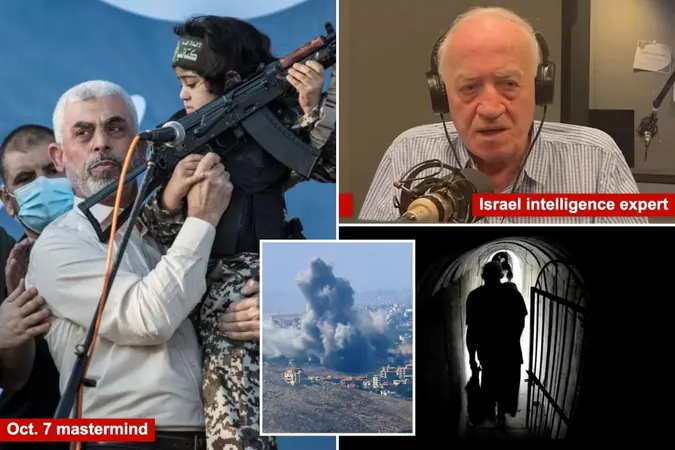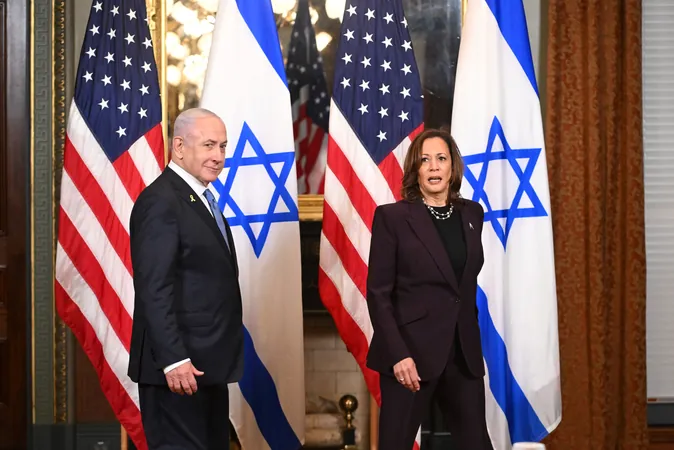
The Dark Past and Uncertain Future of Yahya Sinwar: Why He Must Be Stopped at All Costs
2024-10-06
Author: Ling
The Dark Past and Uncertain Future of Yahya Sinwar
When former Shin Bet interrogator Michael Koubi first encountered Yahya Sinwar in 1988, he saw a man driven by a singular purpose: the destruction of Israel. "I saw a man with murderous eyes, filled with nothing but hate,” Koubi, now 79, recounted recently. His observations came after 180 harrowing hours spent interrogating the mastermind behind the October 7 terrorist attack that left the world reeling.
As Israel reflects on the anniversary of the gruesome attack orchestrated by Sinwar, Koubi's insights paint a grim picture: “Sinwar will never, never accept peace. As long as he is alive, he is a continuing threat to the lives of innocent people.” With Sinwar’s whereabouts reportedly unknown since he disappeared into Hamas' extensive tunnel networks on October 10, uncertainty looms around the potential for peace in the region.
Born in a Khan Younis refugee camp, Sinwar was radicalized at a young age, influenced heavily by figures like Hamas founder Sheikh Ahmed Yassin. By just 13, he was attending sermons that incited violent ideologies, contributing to a worldview centered on hatred and violence. Koubi's chilling encounters with Sinwar revealed not just his relentless ambition but his gruesome methods. “He talked about beheading one suspect and burying another alive," Koubi recalled, astonished by the level of cruelty Sinwar exhibited even toward his own people.
Dubbed "The Butcher of Khan Younis," Sinwar earned notoriety and respect within Hamas through brutal tactics against supposed spies. Sinwar's revelry in indoctrinating the youth further underscores his dangerous ideology; he once recounted separating young children into groups of “Palestinians and Israelis,” mocking the notion of violence against Jews.
After his release in 2011 as part of a prisoner exchange for Israeli soldier Gilad Shalit, Sinwar returned as a hero to Gaza, where he quickly ascended the ranks of Hamas leadership. His strategies culminated in the October 7 massacre, resulting in the deaths of over 1,200 people and the abduction of 251 hostages, a dark chapter in the ongoing conflict.
Israeli officials are now confronted with a critical dilemma: while some propose offers of exile and safety for Sinwar in exchange for the return of hostages, others, like Koubi, warn that releasing such a fervent ideologue would only reignite the cycle of violence. “The only option is to eliminate him,” Koubi insists, echoing the sentiments of many who anticipate that Sinwar will orchestrate further horrific attacks if allowed to live.
As international eyes remain fixed on Gaza and the unfolding conflict, the stakes have never been higher. The ongoing struggle against figures like Sinwar is not just a matter of regional stability; it is about protecting countless innocent lives hanging in the balance. The question looms: can the world afford to let a man so entrenched in violence remain alive? The answer may well dictate the future of peace in the region and beyond.




 Brasil (PT)
Brasil (PT)
 Canada (EN)
Canada (EN)
 Chile (ES)
Chile (ES)
 España (ES)
España (ES)
 France (FR)
France (FR)
 Hong Kong (EN)
Hong Kong (EN)
 Italia (IT)
Italia (IT)
 日本 (JA)
日本 (JA)
 Magyarország (HU)
Magyarország (HU)
 Norge (NO)
Norge (NO)
 Polska (PL)
Polska (PL)
 Schweiz (DE)
Schweiz (DE)
 Singapore (EN)
Singapore (EN)
 Sverige (SV)
Sverige (SV)
 Suomi (FI)
Suomi (FI)
 Türkiye (TR)
Türkiye (TR)